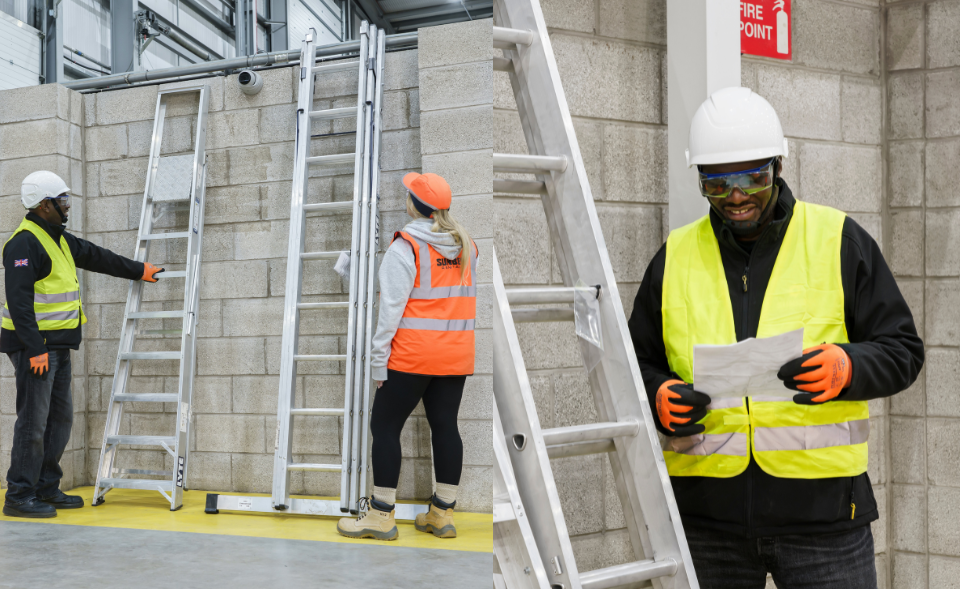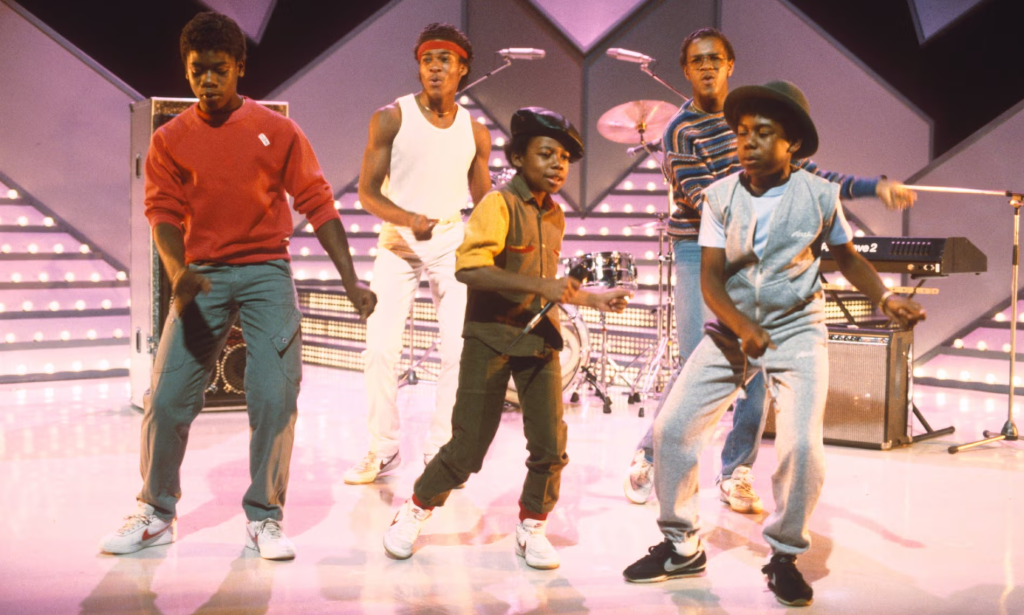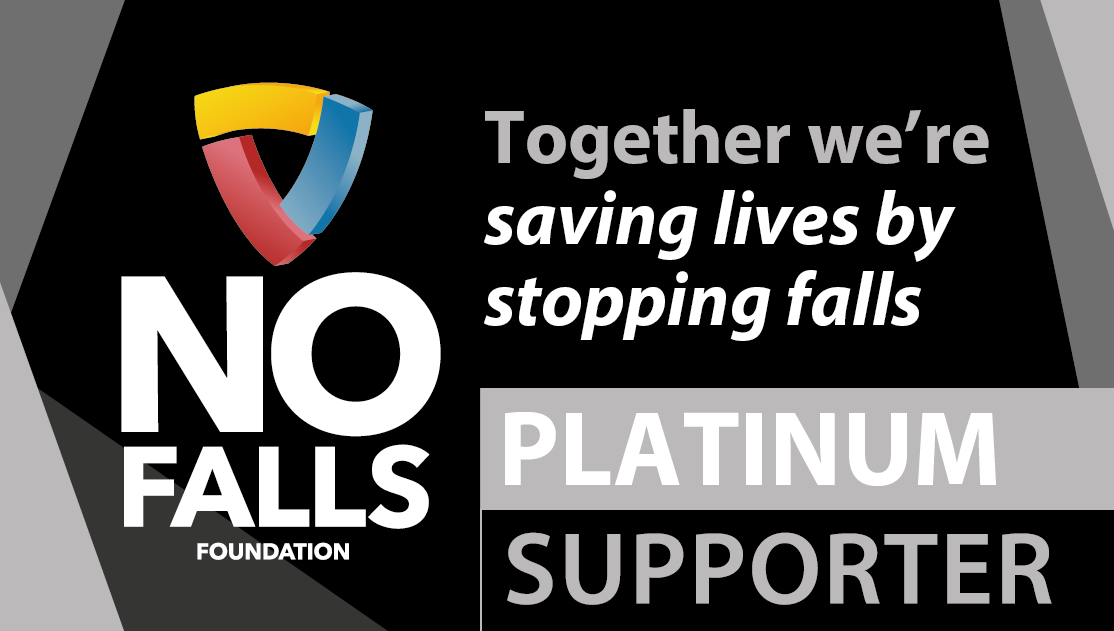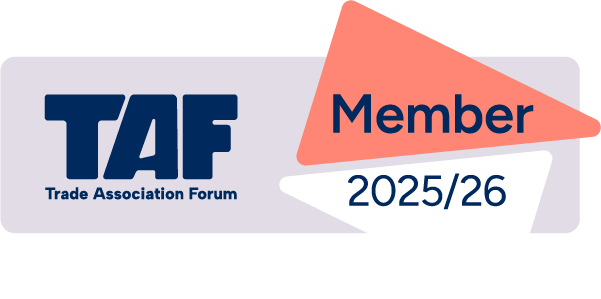The Ladder Association spoke with Dennis Seaton, frontman of Musical Youth and former chairman of our training committee, who’s been recruited by the association’s newest member, Sunbelt Rentals, as a lead training instructor.
We listened to his story – and what a journey it’s been! – to learn the parallels between stage and classroom.
Pass the Knowledge

Photograph: Sunbelt Rentals
Pass the Dutchie ‘pon the left-hand side
Pass the Dutchie ‘pon the left-hand side
It a go bun (give me the music, make me jump and prance)
It a go dung, ya know? (Give me the music, make me rockin’ at the dance)
Now that the Musical Youth hit song Pass the Dutchie is stuck in your head, think about the reggae band’s lead singer, just 14 years old when the song was released in 1982. What would you say he’s up to these days?
To start with, his music career is alive, well and going strong. But 1980s legend Dennis Seaton has yet another profession under his belt. Alongside his life-long calling as a singer, songwriter and record producer, he teaches safe work at height practices as a training instructor for Ladder Association member Sunbelt Rentals.
Sunbelt Rentals is the UK’s largest rental company with over 200 service centres nationwide and over 35,000 customers in sectors covering facilities management, construction, industrial, government and more. They also deliver a range training courses, including the safe use of ladders, powered access equipment and mobile towers.
Dennis himself holds a Ladder Association lead instructor qualification, enabling him to train users and managers on ladder safety, as well as to train others to become training instructors themselves. Not only that, but he also chaired the Ladder Association’s training committee multiple times. His mantra? “When it’s all going right on the site, it doesn’t matter.
It’s if it goes wrong, that’s when everybody starts to ask questions. ‘Was this person trained? Where did they get their training?’ So, Sunbelt Rentals joining the Ladder Association is fantastic because now you’ve got another organisation, and we need more organisations, providing training in the same standard. They are a fantastic company, and they want to deliver the best training, all aspects of it, to their client base.”
From the height of stardom to safety while working at height

Photograph: ITV/Rex/Shutterstock
The band Musical Youth as we know them came together so that mates Michael and Kelvin Grant, Freddie and Patrick Waite, and Dennis Seaton, could perform the music that they loved. “All the other stuff was accidental”, he recalls.
“We never expected to have a number one hit. For me, and I’ll say this wholeheartedly, it was never about being famous. It was about playing music to the best of our ability no matter what age we were. That’s why the band is called Musical Youth.” – Dennis Seaton
After hitting the top of the charts and selling over four million copies of their debut album The Youth of Today, in 1982, they toured the world and released two new albums and seven singles before the group disbanded.
Dennis then launched his solo career and hasn’t stopped since, including another round of Musical Youth tours and performances, from the early 2000s onwards, alongside bandmate Michael Grant. “I’ll always be a youth, and it was the same with becoming an instructor. Never in a million years did I think I’d become an instructor. But now training ladder users and instructors is also my mission.”
We’ve got a generation that’s coming through that need training and I know I’m not going to be here with my experience and knowledge forever.”
He was first roped into safety training by a friend’s sister-in-law in the late 2000s, who saw his performance at an event in Birmingham City Centre. He recounts her saying “I know you can talk ’cause I’ve seen you. Now, if we train you up, do you think you’d come and do some training for us?”
At the time, he was studying music in university, so after earning his degree he went on to do his IPAF instructor course between 2007-08, as his acquaintance was a director at a powered access business. It wasn’t long, though, before Dennis became a Ladder Association-qualified instructor as well, and soon after obtained a PASMA qualification for mobile access tower training.
It’s all about communication
Dennis sees a lot of overlap between performing on stage and in the classroom, not unlike what his friend’s sister-in-law saw in him. “It’s all about communication. When you play music, you’re communicating with people through music. You’re performing. Same as when you’re training. You’re trying to educate people into understanding the risks. It’s still communication.”
I’m very conscious that when I walk to the front of the stage – and I’ve seen people fall off the stage and injure themselves – that’s a fall from height. We’re working at height. So, the dangers are there, you know. Stage areas are dark, there’s leads, wires, and guess what, we all have drinks on stage and I’m very conscious of water and electricity!”
Being in the music industry for most of his life, he’s performed in countless locations. Since becoming an instructor, he’s looked out for how training and work at height happen in venues across the UK and beyond.
He’s also shared some of his 16 years of training experience with a handful of lucky stagehands. “Even recently, while I was about to go on stage, I saw these guys getting some ladders out and we had a little chat. It was nice, they were young but had training and inspection records, and I told them I was glad to see they were doing it right.”
He points out that any gig, especially at festivals, uses structures and equipment that require training. “Ladders are being used, mobile towers are being used, harnesses are being used, powered access is being used…” This includes the 2022 Commonwealth Games, where Musical Youth performed live at the event’s closing ceremony at the Alexander Stadium, in Birmingham.
It was a big honour. I was looking at a photo of it today and there’s me standing on top of the stage, and it’s a massive stage, and there’s 1.5 million eyes on you.”
Climbing the training ladder
Dennis says all his activities, professional or otherwise, are fruits of passion. “I teach my kids to be happy in what they’re doing, not just for the sake of it. Because if it’s for the sake of it, you’re wasting your time.”
The passion for training people to be safe while working at height didn’t take very long to kick in, even if he was recruited without much prior knowledge of it beyond his stage experience. It came from a desire to help others prevent harm.
Seeing people fall from height and get injured made him realise that the worst of it is the aftermath. He brings up Jason Anker and Dylan Skelhorn’s stories as cautionary tales, and Abbi’s as a powerful reminder that there is also another side to it.
It’s not just about the person [who fell from height], it’s about how the whole family suffers too. So, I don’t just see training as another job. It’s educational, and I wanted to get into education, and now I’m helping people.”
It’s been a long, long time
“When Noah built the ark, it was ladders that he used.”
– Dennis Seaton
Ladders have been around for ages, but Dennis wouldn’t want anyone to be fooled by their simplicity as a tool, as this doesn’t mean users don’t need to understand how to use them safely. “A child can use a ladder. But it’s still got to be set up correctly. If you don’t use it correctly, it’s going to cause you some serious damage, even death, as we know.”
He says that, generally, the reason why people fall off a ladder is that they’ve let go of it. “And that’s why ‘get a grip<‘ is a perfect motto. The ladder is the most basic piece of work at height equipment that you can find, but you have to treat it with the respect that it’s due. If you don’t concentrate on what you’re doing, you can get a serious injury. It’s not the height that’s the problem, it’s the [lack of] respect for the height.”
When I first started training, I used to stand there thinking ‘is what I’m saying true?’ And people will challenge you. But then I allow people to challenge me ’cause I want to see their philosophy and their thoughts behind it. Then I always come back with ‘well, because it hasn’t happened to you doesn’t mean it’s not out there.’”
He’s now long enjoyed training, and convincing people that safe work at height with ladders is not just about how to operate them. “People think it’s simple and, in a way, it is but it’s about making sure you select the right ladder; that it’s the correct type of ladder for the job; that it meets the standard; and that the user understands the risks.”
As an experienced performance artist and training instructor, Dennis knows that to get a message across you first need to make a connection. Whether it’s passin’ the Dutchie ‘pon the left-hand side (“It’s always on the left!”) or passing on life-saving knowledge, his journey’s main takeaway is that communication is key to paying it forward.
When you play music, you’re passing on your experiences, lived or not, that people can relate to; and they love it. When they leave my training courses, I hope they’ve learned from and enjoyed them too!”








